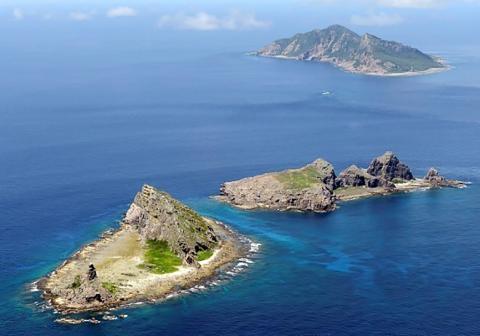The Ministry of Foreign Affairs yesterday reasserted Taiwan’s sovereignty over the Diaoyutai Islands (釣魚台) in the disputed East China Sea, after the Japanese government expedited a plan to include Japan’s territorial claims over the island chain in its school curriculum.
The Japanese Ministry of Education, Culture, Sports, Science and Technology on Tuesday announced that it is moving up implementation of its “national territory education” curriculum from 2022 to next year, according to a Kyodo News report.
Japanese high-school students are to be taught about the legitimacy of Japan’s territorial claims over several disputed islands, including Diaoyutai, as well as islets in the Sea of Japan known as Takeshima in Japan and Dokdo in South Korea.

Photo: Reuters
“The government has maintained a consistent stance on the issue, which is that the Diaoyutai Islands are part of the Republic of China’s territory,” ministry spokesman Andrew Lee (李憲章) said in a press release.
The reality that Taiwan enjoys sovereignty over the archipelago is not going to be changed by any country’s decision to categorize it as their own territory in school textbooks, Lee said.
The Taiwanese government has always advocated for a peaceful solution to territorial disputes to avoid situations in which a concerned party’s unilateral actions lead to heightened tensions in the region, Lee said.
The Diaoyutais, about 120 nautical miles (222.2km) northeast of Taipei, are also claimed by China.
To prevent tensions in the region from escalating, then-president Ma Ying-jeou (馬英九) in 2012 proposed the East China Sea peace initiative while visiting Pengjia Islet (彭佳嶼), about 56km north of Taiwan proper.
The initiative calls for all parties to take action to reduce tensions, abide by international law, ensure the freedom of navigation and overflight, and seek a peaceful resolution to disputes.
After taking office in 2016, President Tsai Ing-wen (蔡英文) has adopted a similar approach, reiterating Taiwan’s sovereignty over Diaoyutais while calling for a peaceful resolution to territorial disputes.

Taiwanese can file complaints with the Tourism Administration to report travel agencies if their activities caused termination of a person’s citizenship, Mainland Affairs Council Minister Chiu Chui-cheng (邱垂正) said yesterday, after a podcaster highlighted a case in which a person’s citizenship was canceled for receiving a single-use Chinese passport to enter Russia. The council is aware of incidents in which people who signed up through Chinese travel agencies for tours of Russia were told they could obtain Russian visas and fast-track border clearance, Chiu told reporters on the sidelines of an event in Taipei. However, the travel agencies actually applied

Japanese footwear brand Onitsuka Tiger today issued a public apology and said it has suspended an employee amid allegations that the staff member discriminated against a Vietnamese customer at its Taipei 101 store. Posting on the social media platform Threads yesterday, a user said that an employee at the store said that “those shoes are very expensive” when her friend, who is a migrant worker from Vietnam, asked for assistance. The employee then ignored her until she asked again, to which she replied: "We don't have a size 37." The post had amassed nearly 26,000 likes and 916 comments as of this

New measures aimed at making Taiwan more attractive to foreign professionals came into effect this month, the National Development Council said yesterday. Among the changes, international students at Taiwanese universities would be able to work in Taiwan without a work permit in the two years after they graduate, explainer materials provided by the council said. In addition, foreign nationals who graduated from one of the world’s top 200 universities within the past five years can also apply for a two-year open work permit. Previously, those graduates would have needed to apply for a work permit using point-based criteria or have a Taiwanese company

The Shilin District Prosecutors’ Office yesterday indicted two Taiwanese and issued a wanted notice for Pete Liu (劉作虎), founder of Shenzhen-based smartphone manufacturer OnePlus Technology Co (萬普拉斯科技), for allegedly contravening the Act Governing Relations Between the People of the Taiwan Area and the Mainland Area (臺灣地區與大陸地區人民關係條例) by poaching 70 engineers in Taiwan. Liu allegedly traveled to Taiwan at the end of 2014 and met with a Taiwanese man surnamed Lin (林) to discuss establishing a mobile software research and development (R&D) team in Taiwan, prosecutors said. Without approval from the government, Lin, following Liu’s instructions, recruited more than 70 software